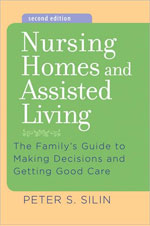Violence in Nursing Homes
Apparently CBC had a programme the other week on resident to resident violence in nursing homes. I didn't see the programme, but from my experience it is not a huge problem, to the extent that someone is injured. I know it happens, but I don't think it should be sensationalized out of proportion.
Why does it happen? Well, when it is instigated by someone with dementia, there can be a number of reasons. The person may have a delirium, which has not been detected and treated. Delirium can be quite sudden in onset--violence/aggression/agitation may be the first sign that it is occurring. People with dementia can often feel threatened as they misinterpret clues in their environment (and frankly--don't we all do the same thing?). They do not have the control or ability to seek out another solution except one in which they protect themselves by hitting out. A wheelchair going over their foot by accident, someone sitting in "their chair," someone getting too close to their personal space--all of these can set someone off.
Environment in important also. A dementia unit needs to have a calming decor with enough space for residents not to feel threatened. It needs to be simple so that people do not get lost. Sometimes an individual with dementia in a large setting or a noisy one can get overwhelmed and agitated; they are not able to cope, but have not skills for calming themselves. In a non dementia unit, someone with dementia is sometimes not able to cope with the competing demands that they feel--for appropriate behaviour, to figure out what to do or where to go, etc.
Older people, as we all know, often have sensory deprivation. With limited vision, and limited hearing, it is easy for someone to become confused and frightened. In that state, a kind of heightened alert, they may respond with aggression.
There also needs to be enough staff around where there is a number of people with dementia, to monitor the behaviour, and potential for something to explode. At the same time, it is not going to happen that there will always be staff around at all times in all areas.
Staff can unwittingly (or not so unwittingly, on rare occasions) create the conditions to set people up for aggression. They may be trying to push someone into doing something--bathe, dress, change--that they do not want to do. They may be hurrying someone, the may startle them by approaching from behind. They may be ignoring a resident, or neglecting them, either inadvertently. When you depend on someone to help you to do something, from dressing to getting on and off the toilet, and you are not receiving the help, it is easy to become frustrated. It is also easy to feel that it is because no one cares about you.
Nursing homes are often crowded. People are living in a common community, often when they would rather not be. They may be lonely, feeling abandoned by family, depressed, or in pain. They have to put up with behaviour that they do not like or approve of; they may have to eat with people that they do not like; they may be surrounded and upset by other residents with dementia. They may simply be bored, or feel like they have cabin fever--shut up in a nursing home or facility and not ever getting out or having a holiday. All of these are reasons that put someone at risk to be more aggressive than they normally would.
What can be done?
1. Make sure that space and environment is appropriate to needs.
2. Insure that staff has ongoing training.
3. Consider the mixture of residents.
4. Provide adequate programming and opportunities for residents.
5. Catch and treat delirium early. This includes ongoing medication reviews.
6. Monitor for pain.
7. Have resources available for residents who are depressed, isolated and lonely.




<< Home